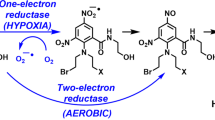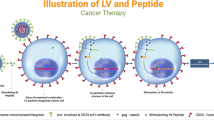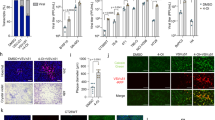Abstract
Conditionally replicating adenoviruses (CRAds) selectively replicate in and thereby kill cancer cells. The CRAd AdΔ24 with pRb-binding-deficient E1A kills cancer cells efficiently. Arming CRAds with genes encoding prodrug-converting enzymes could allow for enhanced anticancer efficacy by the combined effects of oncolytic replication and local prodrug activation. Here, we investigated combination treatment of human colon cancer cell lines with AdΔ24-type CRAds and gene-directed enzyme prodrug therapy (GDEPT) using two different enzyme/prodrug systems, that is, thymidine kinase/ganciclovir (TK/GCV) and carboxylesterase (CE)/CPT-11. On all three cell lines tested, GDEPT with TK/GCV made CRAd treatment less efficacious. In contrast, expression of a secreted form of CE (sCE2) combined with CPT-11 treatment markedly enhanced the efficacy of AdΔ24 virotherapy. Based on this observation, we constructed an AdΔ24 variant expressing sCE2. In the absence of CPT-11, this new CRAd Ad5-Δ24.E3-sCE2 was similarly effective as its parent in killing human colon cancer cells. Low concentrations of CPT-11 inhibited Ad5-Δ24.E3-sCE2 propagation. Nevertheless, CPT-11 specifically augmented the cytotoxicity of Ad5-Δ24.E3-sCE2 against all three-colon cancer cell lines. Hence, the positive contribution of sCE2/CPT-11 GDEPT to colon cancer cytotoxicity outweighed its negative influence on CRAd propagation. Therefore, CRAd-sCE2/CPT-11 combination therapy appears useful for more effective treatment of colon cancer.
This is a preview of subscription content, access via your institution
Access options
Subscribe to this journal
Receive 12 print issues and online access
$259.00 per year
only $21.58 per issue
Buy this article
- Purchase on Springer Link
- Instant access to full article PDF
Prices may be subject to local taxes which are calculated during checkout







Similar content being viewed by others
References
Haviv YS, Curiel DT . Engineering regulatory elements for conditionally-replicative adeno-viruses. Curr Gene Ther 2003; 3: 357–385.
Post LE . Selectively replicating adenoviruses for cancer therapy: an update on clinical development. Curr Opin Investig Drugs 2002; 3: 1768–1772.
Oosterhoff D, van Beusechem VW . Conditionally replicating adenoviruses as anticancer agents and ways to improve their efficacy. J Exp Ther Oncol 2004; 4: 37–57.
Nemunaitis J et al. Intravenous infusion of a replication-selective adenovirus (ONYX-015) in cancer patients: safety, feasibility and biological activity. Gene Therapy 2001; 8: 746–759.
DeWeese TL et al. A phase I trial of CV706, a replication-competent, PSA selective oncolytic adenovirus, for the treatment of locally recurrent prostate cancer following radiation therapy. Cancer Res 2001; 61: 7464–7472.
Heise C et al. ONYX-015, an E1B gene-attenuated adenovirus, causes tumor-specific cytolysis and antitumoral efficacy that can be augmented by standard chemotherapeutic agents. Nat Med 1997; 3: 639–645.
Heise C, Lemmon M, Kirn D . Efficacy with a replication-selective adenovirus plus cisplatin-based chemotherapy: dependence on sequencing but not p53 functional status or route of administration. Clin Cancer Res 2000; 6: 4908–4914.
You L, Yang CT, Jablons DM . ONYX-015 works synergistically with chemotherapy in lung cancer cell lines and primary cultures freshly made from lung cancer patients. Cancer Res 2000; 60: 1009–1013.
Wildner O et al. Adenoviral vectors capable of replication improve the efficacy of HSVtk/GCV suicide gene therapy of cancer. Gene Therapy 1999; 6: 57–62.
Wildner O, Blaese RM, Morris JC . Therapy of colon cancer with oncolytic adenovirus is enhanced by the addition of herpes simplex virus-thymidine kinase. Cancer Res 1999; 59: 410–413.
Wildner O, Morris JC . The role of the E1B 55 kDa gene product in oncolytic adenoviral vectors expressing herpes simplex virus-tk: assessment of antitumor efficacy and toxicity. Cancer Res 2000; 60: 4167–4174.
Stubdal H et al. A prodrug strategy using ONYX-015-based replicating adenoviruses to deliver rabbit carboxylesterase to tumor cells for conversion of CPT-11 to SN-38. Cancer Res 2003; 63: 6900–6908.
Morris JC, Wildner O . Therapy of head and neck squamous cell carcinoma with an oncolytic adenovirus expressing HSV-tk. Mol Ther 2000; 1: 56–62.
Lambright ES et al. Inclusion of the herpes simplex thymidine kinase gene in a replicating adenovirus does not augment antitumor efficacy. Gene Therapy 2001; 8: 946–953.
Chen MJ et al. Enhanced efficacy of Escherichia coli nitroreductase/CB1954 prodrug activation gene therapy using an E1B-55K-deleted oncolytic adenovirus vector. Gene Therapy 2004; 11: 1126–1136.
Fueyo J et al. A mutant oncolytic adenovirus targeting the Rb pathway produces anti-glioma effect in vivo. Oncogene 2000; 19: 2–12.
Heise C et al. An adenovirus E1A mutant that demonstrates potent and selective systemic anti-tumoral efficacy. Nat Med 2000; 6: 1134–1139.
Geoerger B et al. Oncolytic activity of p53-expressing conditionally replicative adenovirus AdDelta24-p53 against human malignant glioma. Cancer Res 2004; 64: 5753–5759.
Suzuki K, Alemany R, Yamamoto M, Curiel DT . The presence of the adenovirus E3 region improves the oncolytic potency of conditionally replicative adenoviruses. Clin Cancer Res 2002; 8: 3348–3359.
Wang Y et al. E3 gene manipulations affect oncolytic adenovirus activity in immunocompetent tumor models. Nat Biotechnol 2003; 21: 1328–1335.
Nanda D et al. Treatment of malignant gliomas with a replicating adenoviral vector expressing herpes simplex virus-thymidine kinase. Cancer Res 2001; 61: 8743–8750.
Freytag SO et al. A novel three-pronged approach to kill cancer cells selectively: concomitant viral, double suicide gene, and radiotherapy. Hum Gene Ther 1998; 9: 1323–1333.
Nagata K, Guggenheimer RA, Hurwitz J . Adenovirus DNA replication in vitro: synthesis of full-length DNA with purified proteins. Proc Natl Acad Sci USA 1983; 80: 4266–4270.
Schaack J, Schedl P, Shenk T . Topoisomerase I and II cleavage of adenovirus DNA in vivo: both topoisomerase activities appear to be required for adenovirus DNA replication. J Virol 1990; 64: 78–85.
Wong ML, Hsu MT . Involvement of topoisomerases in replication, transcription, and packaging of the linear adenovirus genome. J Virol 1990; 64: 691–699.
Howe JA et al. Evaluation of E1-mutant adenoviruses as conditionally replicating agents for cancer therapy. Mol Ther 2000; 2: 485–495.
Balague C et al. Human papillomavirus E6E7-mediated adenovirus cell killing: selectivity of mutant adenovirus replication in organotypic cultures of human keratinocytes. J Virol 2001; 75: 7602–7611.
Fuerer C, Iggo R . 5-Fluorocytosine increases the toxicity of Wnt-targeting replicating adenoviruses that express cytosine deaminase as a late gene. Gene Therapy 2004; 11: 142–151.
Oosterhoff D et al. Adenoviral vector mediated expression of a gene encoding secreted, EpCAM targeted carboxylesterase-2 sensitises colon cancer spheroids to CPT-11. Br J Cancer 2005; 92: 882–887.
Oosterhoff D et al. Gene-directed enzyme prodrug therapy for osteosarcoma: sensitization to CPT-11 in vitro and in vivo by adenoviral delivery of a gene encoding secreted carboxylesterase-2. Mol Cancer Ther 2003; 2: 765–771.
Rosenfeld ME et al. Adenoviral-mediated delivery of the herpes simplex virus thymidine kinase gene selectively sensitizes human ovarian carcinoma cells to ganciclovir. Clin Cancer Res 1995; 1: 1571–1580.
van Beusechem VW et al. Conditionally replicative adenovirus expressing p53 exhibits enhanced oncolytic potency. Cancer Res 2002; 62: 6165–6171.
Oosterhoff D et al. Secreted and tumour targeted human carboxylesterase for activation of irinotecan. Br J Cancer 2002; 87: 659–664.
Carette JE et al. Conditionally replicating adenoviruses expressing short hairpin RNAs silence the expression of a target gene in cancer cells. Cancer Res 2004; 64: 2663–2667.
Author information
Authors and Affiliations
Rights and permissions
About this article
Cite this article
Oosterhoff, D., Pinedo, H., Witlox, M. et al. Gene-directed enzyme prodrug therapy with carboxylesterase enhances the anticancer efficacy of the conditionally replicating adenovirus AdΔ24. Gene Ther 12, 1011–1018 (2005). https://doi.org/10.1038/sj.gt.3302492
Received:
Accepted:
Published:
Issue Date:
DOI: https://doi.org/10.1038/sj.gt.3302492
Keywords
This article is cited by
-
Antitumor efficacy of cytosine deaminase-armed vaccinia virus plus 5-fluorocytosine in colorectal cancers
Cancer Cell International (2020)
-
Armed replicating adenoviruses for cancer virotherapy
Cancer Gene Therapy (2009)
-
INGN 007, an oncolytic adenovirus vector, replicates in Syrian hamsters but not mice: comparison of biodistribution studies
Cancer Gene Therapy (2009)
-
An improved human carboxylesterase for enzyme/prodrug therapy with CPT-11
Cancer Gene Therapy (2008)
-
Systemic Toxicity–Efficacy Profile of ICOVIR-5, a Potent and Selective Oncolytic Adenovirus Based on the pRB Pathway
Molecular Therapy (2007)



